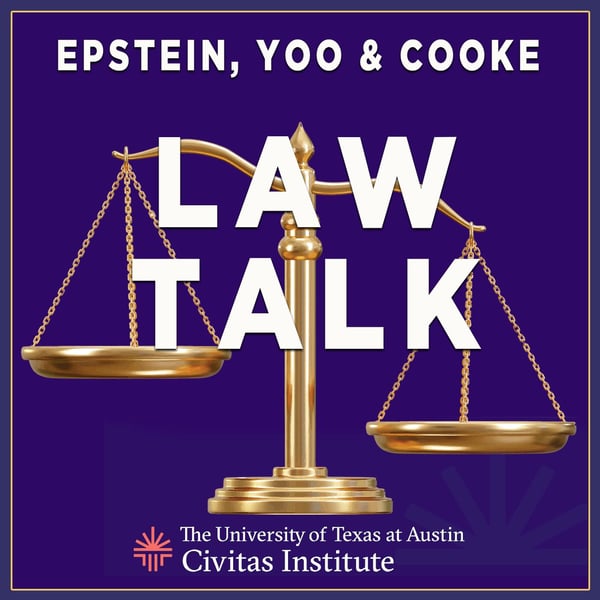Immunity Idols and Chevrons
Law Talk With Epstein, Yoo & Senik
The Civitas Institute at the University of Texas at Austin
4.9 • 677 Ratings
🗓️ 3 July 2024
⏱️ 52 minutes
🧾️ Download transcript
Summary
Transcript
Click on a timestamp to play from that location
| 0:00.0 | Go Guy. |
| 0:06.4 | Welcome to Law Talk, a production of the Hoover Institution, hosted this week by me, Charles |
| 0:12.7 | C.W. Cook, senior editor of National Review, and I'm here with John You and Richard Epstein. |
| 0:20.4 | And goodness me, did Troy Seneck choose a week to miss on Monday morning. |
| 0:25.9 | We got the bombshell decision in the bombshell case of Trump versus United States. |
| 0:31.4 | It was six to three. |
| 0:32.7 | Well, sort of six to three. |
| 0:34.1 | We'll get into that. |
| 0:35.7 | And the court ruled that American presidents enjoy immunity for official acts and no |
| 0:41.2 | immunity for unofficial act. |
| 0:43.2 | That's the base headline. |
| 0:45.1 | Richard, I'll start with you. |
| 0:46.6 | Before we get to the various details of the decision and the criticisms that have been |
| 0:51.3 | made of it, including in the dissents, what do you make of the basic |
| 0:54.7 | reasoning here? Is it correct? Let me put it this way. Nobody knows where this comes from in the |
| 1:01.8 | sense that all doctrines with respect to immunity are made by judicial implication from a text |
| 1:07.1 | that doesn't even speak of the problem. And when I first looked at this stuff, I thought that |
| 1:11.9 | many of the issues would start to talk about not presidential immunities on a separation of powers |
| 1:17.3 | basis, but rather would address the thing in concerning with his First Amendment privileges of one |
| 1:22.5 | kind or another. And so just to see the swift and emphasis kind of blew me away. And I think basically the intuition is clearly right here. And let me explain why it is. Before we had this recent decision, there were a lot of learned discussions that were clearly incorrect, saying in a sec that the issue of presidential immunity always had to be lodged into sitting president, |
| 1:45.2 | and so that once you left office, you were vulnerable. And this, of course, is absolutely crazy |
| 1:49.9 | because it means that something can be protected while you're in office, and afterwards, |
... |
Please login to see the full transcript.
Disclaimer: The podcast and artwork embedded on this page are from The Civitas Institute at the University of Texas at Austin, and are the property of its owner and not affiliated with or endorsed by Tapesearch.
Generated transcripts are the property of The Civitas Institute at the University of Texas at Austin and are distributed freely under the Fair Use doctrine. Transcripts generated by Tapesearch are not guaranteed to be accurate.
Copyright © Tapesearch 2025.

